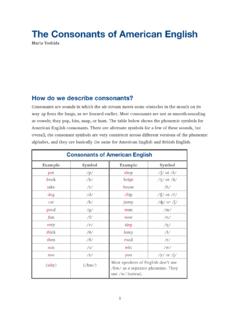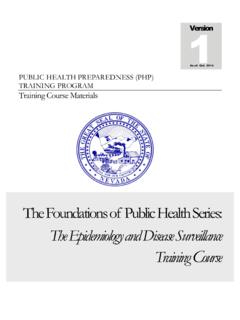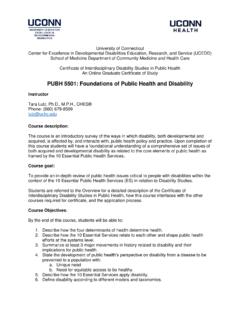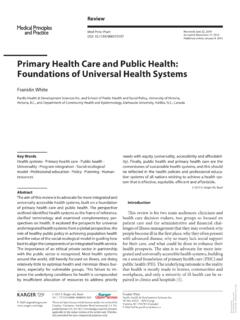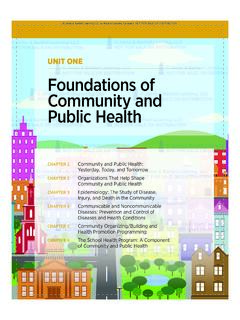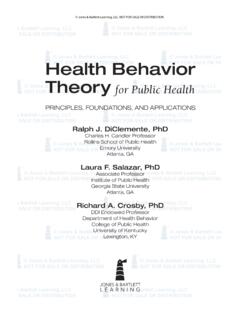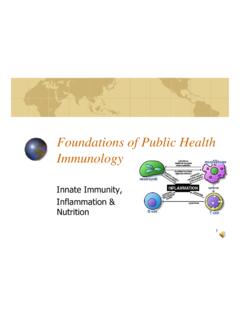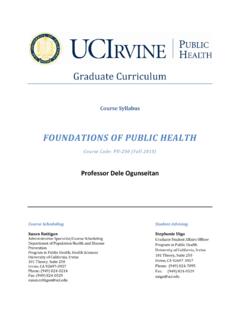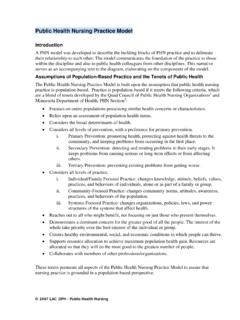Transcription of Foundations of Public Health - UC Irvine, UCI Open
1 Page | 1 Foundations of Public Health PubHlth 200 Master of Public Health (MPH) Degree Curriculum Fall 2009 SST 238 Fridays 9:30 AM 12:20 PM Course Website: Professor Dele Ogunseitan; Office hour : By appointment Catalogue Description : PH-200 (4) F. This course presents the overarching framework, principles, and core responsibilities of Public Health research and practice from a multidisciplinary perspective. The course also provides the necessary foundation for further studies toward advanced cross-cutting approaches essential for Public Health practice. Prerequisite: Graduate standing or consent of instructor. Extended Course Description The graduate Foundations course is designed for incoming graduate students in professional Public Health degrees, taking into consideration diverse academic backgrounds and skills. The course provides an opportunity for students to investigate the fundamental determinants and the complex set of intermediate factors that underpin Health and disease status in different populations at various scales of analysis.
2 After completing the course, students should be knowledgeable about the diversity of conceptual and methodological approaches and academic disciplines which inform Public Health research and practice. The course content highlights core competencies and cross-cutting themes essential for successful Public Health intervention programs. The course is organized in two major requirements. During the first segment, students are introduced to how Public Health is practiced at the international, nation, regional, and local levels, with presentations drawing from Milestones in Public Health a project that highlights historical developments on 10 major causes of morbidity and mortality in human populations ( ). Each student is expected to build on these presentations to develop a scholarly review of current burden of disease at the regional or global level, using concrete examples of how Public Health core disciplines and cross-cutting themes are made to work for identifying and solving problems at those scales of analyses.
3 For this review, Page | 2 students are expected to consult, for example, the World Health Organization s project on the Global Burden of Disease ( ). The second requirement is for each student to develop a Public Health problem-solving proposal that builds upon our exploration of the theoretical Foundations necessitating transdisciplinary approaches in the natural and social sciences and administrative functions in Public Health . These theoretical linkages, following exposure to how Public Health practice is organized in the world, will hopefully prepare students to explore more deeply within the curriculum organized around the core disciplines of biostatistics, epidemiology, environmental Health sciences, social and behavioral sciences, and Health policy and administration. The final examination will be based on lecture materials. Grading Criteria Topical Review Article (4000 words) = 40% Proposal Development = 40% Final Examination = 20% Textbooks Milestones in Public Health .
4 The book is free from Pfizer s website: ( ). Students must also listen to the accompanying podcasts. Rowitz, Louis. 2006. Public Health for the 21st Century: The Prepared Leader. 521 Pages. Jones & Bartlett: Sudbury, Massachusetts. ISBN 0-7637-4778-5. Rowitz, Louis. 2008. Public Health Leadership: Putting Principles into Practice. 570 pages. Jones & Bartlett: Sudbury, Massachusetts. ISBN-13: 9780763750503 or ISBN: 0763750506 Synopsis Public Health Leadership: Putting Principles into Practice is the first book dedicated to the investigation of leadership in the Public Health arena. It goes beyond a description of what leadership is by serving as a "how to" guide for successful Public Health leadership. This publication demonstrates what leadership is, who holds the tools of effective leadership, what Public Health challenges lie ahead, and how individuals can influence the future of this dynamic field. Case studies in each section illustrate the practical applications of the principles discussed.
5 Page | 3 Example Target of Proposal Writing: Scholars Grants in Public Health Program Description Pfizer Inc is proud to sponsor the Pfizer Scholars Grants in Public Health . These awards are meant to support the career development of junior faculty in Public Health . This educational grants is nationally competitive, and chosen by an independent Academic Advisory Board of recognized leaders in Public Health . Up to two grants of $130,000 each, paid over two years, will be awarded to individuals who are pursuing community-based, Public Health practice research intended to foster academic science and knowledge of Public Health , and collaborative partnerships between accredited schools or programs of Public Health and state and local departments of Public Health . The proposed research should support the needs of a state or local Public Health organization. The research should focus on Public Health practice issues likely to have a demonstrable impact on community Health and/or the Public Health system.
6 Award funding is primarily intended for salary support. The applicant must demonstrate that at least 75% of his or her professional time will be devoted to research. Proposals involving head-to-head clinical trials or veterinary Health will not be considered. Interdisciplinary and translational research proposals are encouraged Page | 4 Schedule of Topics Week 1 Introduction and orientation to the core competencies and cross- cutting, interdisciplinary approaches in Public Health . Milestone: Eradication of Smallpox Week 2 The real causes of death and disability: The Global Burden of Diseases. Essential Resource: World Health Organization s GBD project ( ) Milestone: Automotive Safety Week 3 Integrative Public Health research and practice at the national level. Essential Resource: Centers for Disease Control and Prevention ( ) Milestone: Environmental Health Week 4 Integrative Public Health research and practice at the regional level.
7 Essential Resource: California Department of Health Services ( ) Milestone: Infectious Disease Control Week 5 Integrative Public Health research and practice at the local level. Essential Resource; Orange County Health Care Agency ( ) Milestone: Cancer Week 6 Scholarly Review Due Student Presentations Milestone: Cardiovascular Disease Page | 5 Week 7 Theoretical Foundations of the transdisciplinary approach in Public Health research and practice The natural sciences. Milestone: Safer and Healthier Foods Week 8 Theoretical Foundations of the transdisciplinary approach in Public Health research and practice The social and behavioral sciences. Milestone: Maternal and Child Health Week 9 Theoretical Foundations of the transdisciplinary approach in Public Health research and practice Public Health administration and intervention program implementation. Milestone: Oral Health Week 10 Discussion of Proposals.
8 Milestone: Addiction Milestone: Public Health Infrastructure Week 11 Final Examination Page | 6 Other Recommended Books Nelson, Jane, C., Joyce Essien, Richard Loudermilk and Daniel Cohen. 2001. The Public Health Competency Handbook. Population Health Futures. 279 Pages plus Compact Disc. Synopsis The Public Health Competency Handbook is the first hands-on guide that outlines the critical organizational competencies required for improvements in the delivery of the Essential Public Health Services by Public Health agencies and local Public Health system partners. The 276-page handbook is designed to facilitate the creation of an organizational culture that supports learning across organizational levels and programmatic areas. The 3-ring binder, with color-coded sections and accompanying CD, contains field-tested, easy to use forms, exercises, and learning tools; comprehensive appendices and references. Sidebars throughout the book translate concepts into real world applications and issues for discussion.
9 Lee, Phillip, R., Rosemarie Rizzo Parse, Fatima M. Rodriguez, Carroll L. Estes. 2003 (7th edition) The Nation s Health . Jones and Bartlett Publishers. 606 Pages. Synopsis This compendium of articles provides a clear view of the factors affecting the Health of Americans and the role of Public Health , medical care, and the community in ensuring the nation's Health . The Seventh Edition continues the emphasis of earlier editions on the Health of the population, the determinants of Health , women's Health , long term care, and the precarious set of circumstances faced by the nation's Public Health and Health care systems as we begin the 21st century. New issues, particularly related to bioterrorism and community Health are addressed in this edition. This volume also includes coverage of tobacco, immunizations, HIV/AIDS, environmental Health , dietary guidelines, physical activity, and food safety. In addition, a major new feature is an article on community problem solving, emphasizing a multidisciplinary approach to collaborative practice and research to improve community Health .
10 Coreil, Jeannine, Carol A. Bryant, and J. Neil Henderson. 2001. Social and Behavioral Foundations of Public Health . Sage Publications. 376 Pages. Synopsis The social and behavioral sciences have come of age within Public Health . In this comprehensive text, a rich body of knowledge and theory from social and behavioral sciences are applied to contemporary Health issues. A guiding principle of the book is the importance of social context and cultural construction in the analysis of Health problems. The unifying framework is an ecosocial systems approach that addresses multiple layers of influence on Health . The book enlarges the dominant "risk factor" approach to Health behavior by giving in-depth attention to the social environment. Similar volumes have addressed single disciplines and/or Health and medicine are broadly defined; this text draws from many disciplines (sociology, anthropology, social psychology, demography, gerontology, economics, and history), and uses examples and case studies specifically from the forefront of Public Health .

